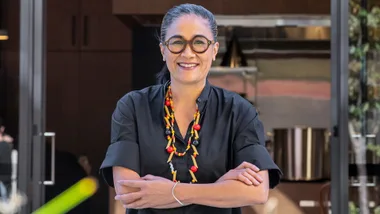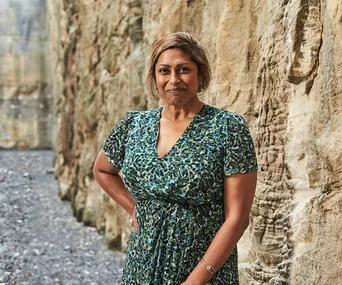I first had the privilege of collaborating with Dwayne Bannon-Harrison when I was invited to curate one of Carriageworks’ Summer Night Markets. I was struck by his innate respect and warmth towards all beings, combined with his extraordinary knowledge and wisdom about his country and Mother Earth. If I think about sustainability in terms of maintaining a balance between different parts of society and the environment, Bannon-Harrison, through his inspiring cultural and culinary practices continues to teach so much, to so many of us. – Kylie Kwong
Community x Kylie: Dwayne Bannon-Harrison
Native ingredients and Indigenous cooking techniques have found their way into some of Australia’s top kitchens in recent years, as more and more chefs turn their gaze closer to home and look to connect with the people, communities and landscape around them.
Dwayne Bannon-Harrison has been at the forefront of this movement, working with some of the country’s leading chefs by sharing his invaluable knowledge and wisdom, and cultural insights.
A Yuin man from the Shoalhaven region of New South Wales, Bannon-Harrison is the managing director of Ngaran Ngaran Culture Awareness, an organisation that seeks to share the cultural practices and knowledge of the world’s oldest living culture. He also runs a catering company, Mirritya Mundya – which means hungry blackfish – with his wife Amelia. The pair use smoke, fire and Indigenous ingredients to create accessible and delicious dishes to serve via their custom food trailer and at pop-up events.
“There are around 6000 Indigenous flavours through proteins, vegetables, nuts and fruits,” says Bannon-Harrison. “It’s quite phenomenal.”
With so many complex flavours and experiences to be discovered, Australian chefs such as Kylie Kwong, Ben Shewry and Curtis Stone have all turned to Bannon-Harrison for guidance on their Indigenous culinary journeys.
“We’re really conscious of helping chefs to find their connection with community and to enjoy it, whether it’s a seasonal witchetty grub collected from northern Victoria or green ants from Maningrida in the Northern Territory,” he says. “If these chefs are really serious about it, there’s a code of ethics, and that comes back to cultural protocol and practice… They’re going to have to dig into that world and do the work.”
As more chefs and businesses engage in these journeys, a permanent place for Indigenous culture is being established within the culinary industry. “The more Aboriginal people involved in the industry in Australia today, the better it is for the country,” says Bannon-Harrison. “Whether restaurants work towards a higher Indigenous employment figure, or even integrate Indigenous elements into the menu or ambience of the restaurant.”
He believes it’s better for the earth, too. “The more natives in the ground means the country is going to be healthier and rejuvenated, having the plants it once had. Heal the land, heal the people.”
Bannon-Harrison learned these teachings from his grandfather, Yuin elder Uncle Max “Dulumunmun” Harrison, who learned from five masters of Aboriginal lore. “Seasonality is one thing. And the other one is, we only take what we need. That is, culturally as we put it, a law.”
Bannon-Harrison hopes the use of native ingredients in modern Australian cuisine will keep growing, along with the presence of Indigenous entrepreneurs, and for both to hold their own on the world stage. “It’s about pushing those messages out – we’re here, we’re kicking and, excuse the pun, the world is a massive oyster for us,” he says.
In the future he’d love to see an Indigenous food alley in Sydney, along with an increased presence in the tourism market. Along with this, Bannon-Harrison hopes his food will continue to connect people
and break down barriers.
“We have a very inconsistent and complex history with this country,” he says. “We’re starting to become very aware and some of us are accepting it for what it is, and coming together with Aboriginal people around the table. Food is a connector – it brings people together.”
But it’s a journey, Bannon-Harrison says, that will never really end. “When people ask how chefs can properly engage with Aboriginal communities… It’s so broad, because no one will ever know everything. And that’s the beautiful thing.”
Introduction by Kylie Kwong. Words by Jordan Kretchmer.


